Business consulting is a challenging undertaking. From being problem solvers to efficient communicators, there are several qualities for business consultants to master.
Even then, their job is not free of hurdles!
The bottlenecks include the inability to foresee trends, unorganized business data, analyzing risks inaccurately, the constant back and forth between multiple applications, and the list goes on.
So, how do you ensure these challenges do not affect your client offerings?
That’s where business consulting software solutions come in.
In this blog, I will share a comparative analysis of the 11 best tools for business consulting that can make things easier for you.
Here’s your first glance-
| Software Name | Best For | Pricing (Starts From) |
|---|---|---|
| Best CRM Software | ||
| BIGContacts | Contact Management Tool for Small Businesses & Startups | $9.99/user/month |
| HubSpot CRM | Lead Management | $18/month |
| Best Project Management Software | ||
| ProProfs Project | Enterprise Project Management | $39.97/month |
| ClickUp | Task Management | $7/member/month |
| Best Billing & Invoicing Software | ||
| FreshBooks | Accounting Software for Business Owners | $8.50/month |
| QuickBooks | Managing Income Expenses & Taxes | $15/month |
| Best Time Tracking Software | ||
| Clockify | Productivity Tracking | $3.99/user/month |
| factoHR | Time Tracking | Custom Pricing |
| TimeCamp | Project Profitability Analysis | $2.99/user/month |
| Best Proposal Software | ||
| PandaDoc | Contract Management | $19/seat/month |
| Proposify | Sales Proposal Templates | $49/user/month |
List of the Top 11 Business Consulting Software Tools
As someone who has closely followed different products, I’ve categorized them into several sections, viz. CRM, project management software, time tracking software, proposal software, etc.
While most of these reviews are based on what I think of each tool, I’ve also included feedback I received from existing users, peers, and industry experts.
Ready to ditch the spreadsheets and start streamlining workflows? Read on!
Best CRM Software
Customer Relationship Management (CRM) tools help centralize customer data, automate manual tasks, and optimize sales and support efforts. They also provide analytics for business performance to help you make data-driven decisions.
1. BIGContacts – Best Contact Management Tool for Small Businesses & Startups
When I learned about BIGContacts from an industry peer, I was initially a bit skeptical. After all, you don’t get to see a CRM every day that’s simple to use, has all the necessary features, and is also surprisingly affordable.
Thanks to its trial plan – I could test it without having impractical feature limitations, like most free software today.
I think the software excels in contact management. It’s so easy to add, edit, and delete contacts! I can find a specific contact using the search box, even if I just have a partial name or email address. It also lets me sort contacts by pending or upcoming activity, opportunity, last contact, or last communication.
BIGContacts also has workflow automation features to streamline repetitive processes like sending follow-up emails. The tools also let you capture leads, connect web forms, import spreadsheets, and create customizable contact records.
Having used it for over a year now, I think it’s a great business consulting software for startups and small businesses.
What You’ll Like:
- Allows you to manage contact details, previous interactions, transactions, notes, social media activity, etc., in one place
- Email marketing automation features enable you to craft personalized drip campaigns
- Calendar view and to-do lists to keep track of upcoming tasks
- In-depth reports to stay updated with business performance
- Two-way synchronization with QuickBooks to keep transactions, invoices, and other details updated
What You May Not Like:
- The free trial period may not be enough to explore the software entirely
- The webform connection requires users to have some basic HTML knowledge
Pricing:
- Forever free plan for startups with 100 contacts.
- Paid starts at $9.99/month with a 15-day free trial.
2. HubSpot CRM – Best for Lead Management
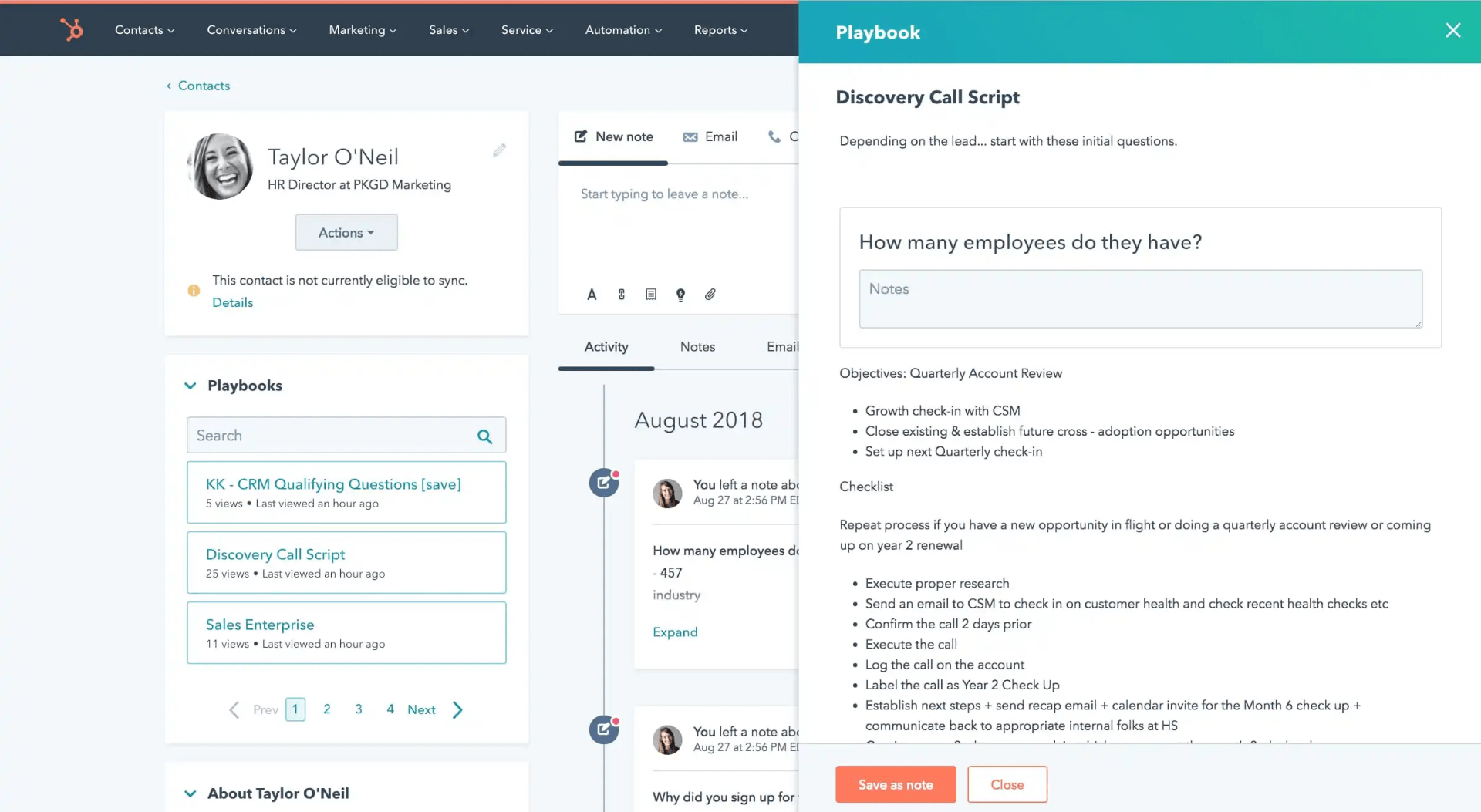
Image Source: Hubspot
HubSpot was the first-ever CRM that I used. I mean, the concept of a free tool is intriguing – you get everything you need without having to spend a dime!
With the tool’s lead management features, my team was on cloud nine – having finally escaped the chaos of spreadsheets.
It was super easy to create lead lists, track interactions, and send personalized emails. I also liked the built-in reporting feature, which gave me insights into lead generation and conversion rates.
But, as I started using the tool more frequently, I realized that the free version had its limitations. For example, I couldn’t create custom lead scoring rules or automate my lead nurturing process.
Frankly speaking, it was slightly disappointing. Regardless, I still think it’s one of the best CRM software for consultants looking for a free tool to get started with.
What You’ll Like:
- Keeps customer data clean by using automation to enforce consistency and remove outdated data from your CRM
- Custom templates to generate personalized email content based on your recipient’s interests and behavior
- Detailed reports on sales activity, productivity, and team performance
- A mobile CRM application to access important client information anytime, anywhere
- Keeps track of all available opportunities with the help of a visual pipeline
What You May Not Like:
- The free plan doesn’t offer several features like sales automation, custom reporting, analytics, etc.
- You may find the reporting capabilities to be somewhat limited
Pricing:
- A free plan is available (without features like automation, custom reports, etc.). Paid options start at $18/month.
Best Project Management Software
With the right project management software, you can plan projects, improve collaboration among team members, and monitor them. They also help streamline communication, save time, and increase productivity to boost profitability.
3. ProProfs Project – Best for Enterprise Project Management
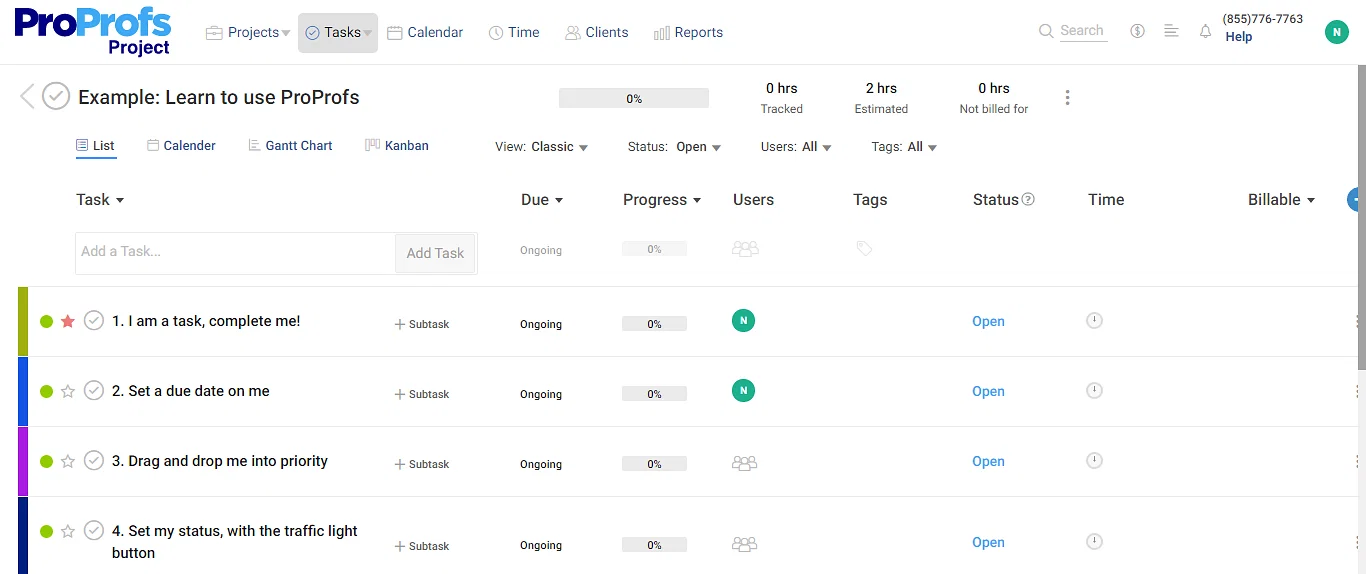
Image Source: Simplilearn
While managing dozens of projects across various industries, I also got to try different project management software solutions. I used ProProfs Project for almost two years, and it came across as a great enterprise project management tool.
What I loved the most was how easy it was to plan projects. I could create detailed project plans with Gantt charts, timelines, and dependencies.
It also helped me identify probable issues early on with its efficient risk management capabilities. Plus, with real-time notifications, it was easy to ensure that all projects met their deadlines.
Team collaboration is a stronghold of the software. I could easily create discussion forums and share files with team members, all within the same platform!
What You’ll Like:
- Gantt charts and Kanban boards to track progress, identify dependencies, and manage resources efficiently
- Collaboration with team members using comments, sharing files, discussing tasks, etc.
- Enables you to schedule and prioritize projects to meet deadlines consistently
- Automates invoicing to make the billing process more efficient and reduce errors
- Detailed reports to identify bottlenecks and areas for improvement to optimize the project management processes
What You May Not Like:
- The software requires a constant and stable internet connection to function seamlessly
- The software comes with plenty of enterprise-level project management features, which may not be possible to explore in the short trial period
Pricing:
- Starts at $39.97/month. A 15-day free trial is available.
4. ClickUp – Best for Task Management
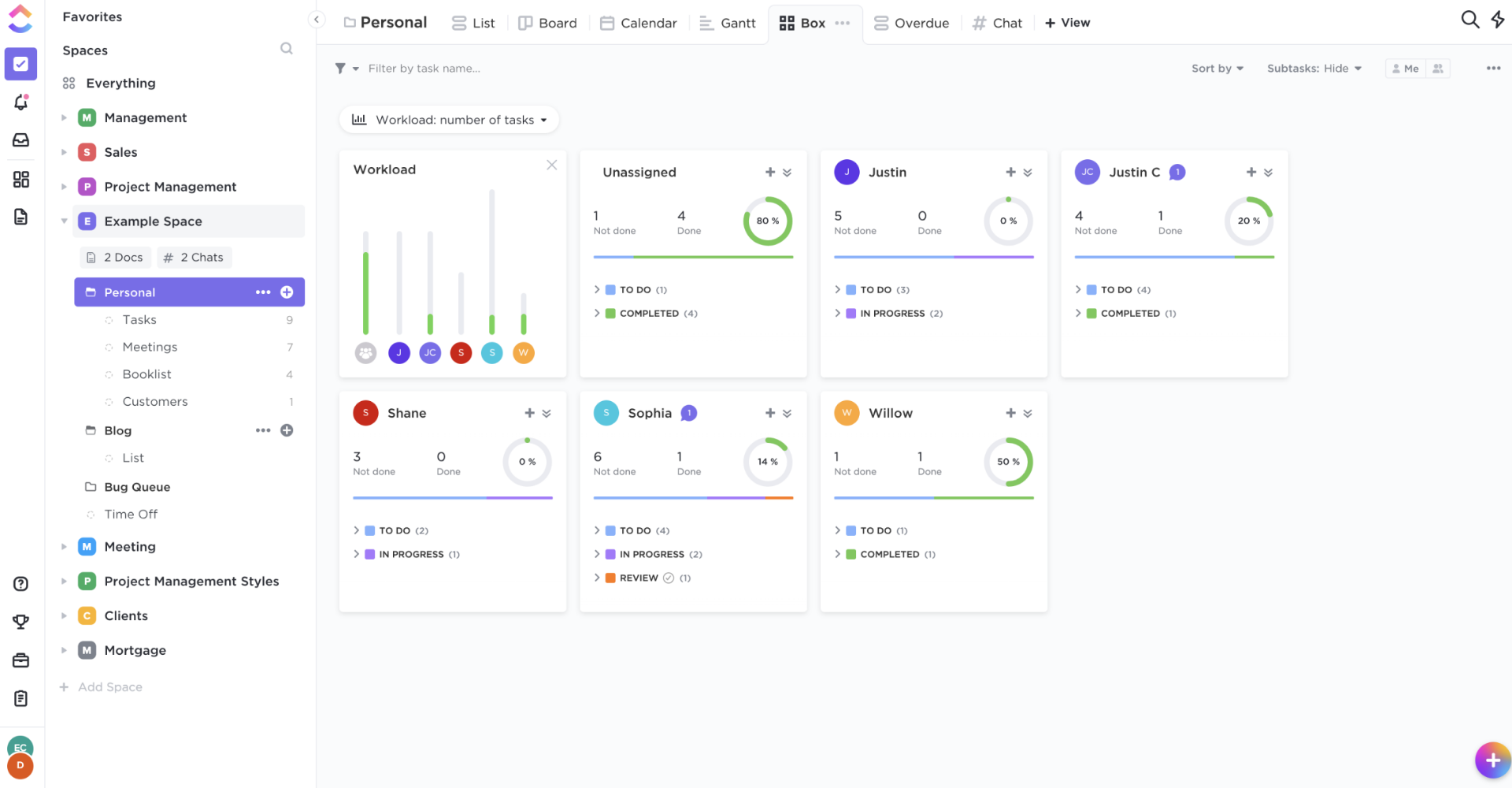
Image Source: G2
I think ClickUp is one of the best project management software for consultants looking for a tool to effortlessly manage tasks.
I used to have a combination of two to three different tools to manage my tasks. It was a mess! I had tasks scattered everywhere, and it was difficult to keep track of everything.
ClickUp has changed all that!
It’s a single-view dashboard where I can see all tasks, projects, and deadlines in one place. I can easily break down tasks into subtasks and use Kanban boards to visualize the workflow.
I also love that the software allows me to create custom fields.
For example, I can have a custom field for each client I work with. This makes it easy to see all the tasks I need to complete for each client at a glance.
What You’ll Like:
- Customizable task management with task automation, sprint points, custom fields, etc.
- Simplifies complex projects by breaking them down into levels of subtasks
- Automates routine work and processes with customizable actions, triggers, and conditions
- The ability to save time by leveraging hundreds of templates for team use cases, views, tasks, checklists, etc.
- Lets you sync your team calendars, messaging apps, cloud storage, etc., to keep all your tools in one place
What You May Not Like:
- The free plan comes with only 100 MB of storage space, which is slightly impractical for everyday use
- Some users have reported occasional performance issues
Pricing:
- A free plan is available (with limited storage space). Paid options start at $7/member/month.
Best Billing & Invoicing Software
Accounting tools help streamline payment processes, reduce manual errors, and improve cash flow management. With the right tool in hand, you can also have a centralized platform to make tasks like bookkeeping, tracking expenses, and generating reports look effortless.
5. FreshBooks – Best Accounting Software for Business Owners
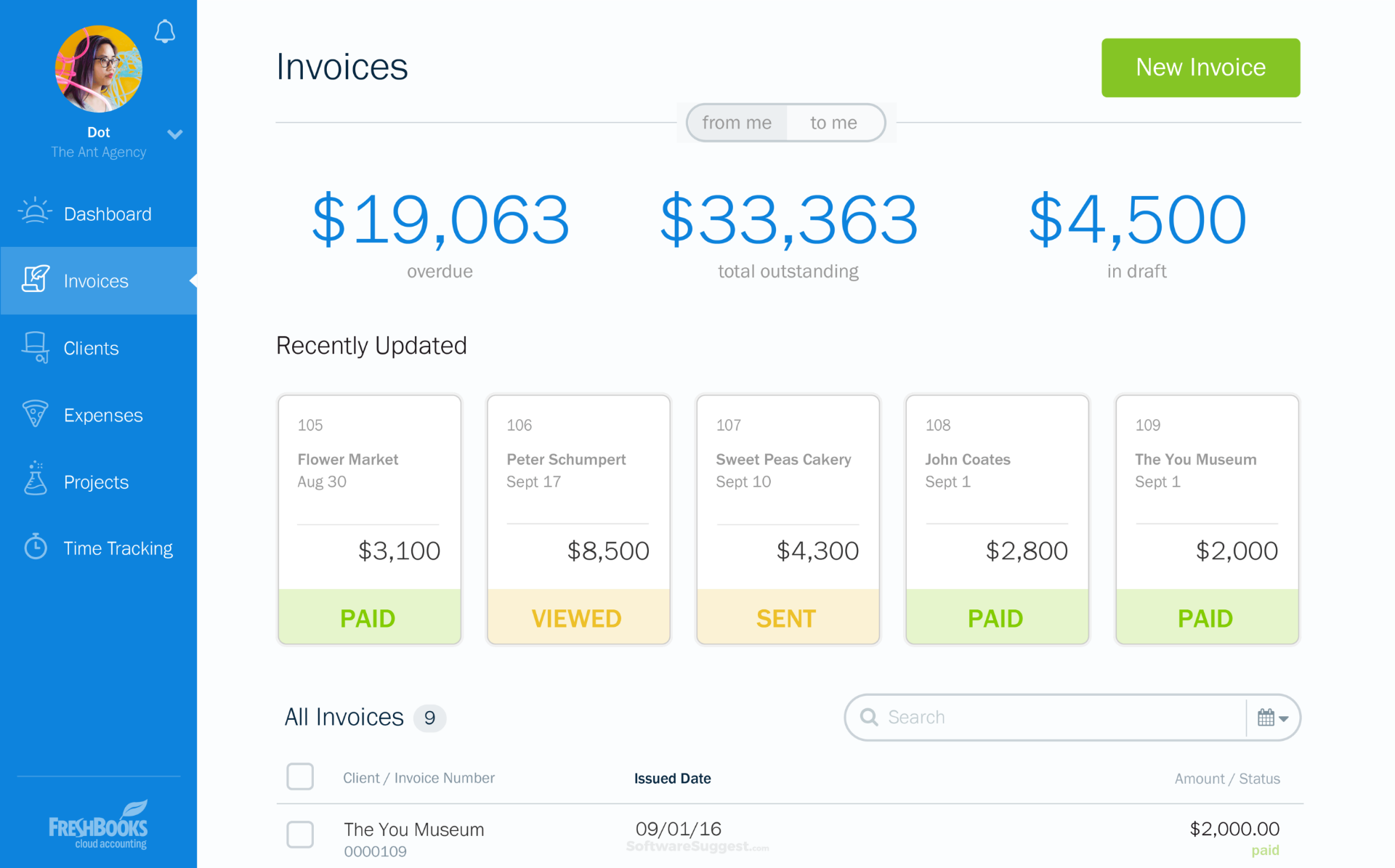
Image Source: Software Suggest
Manually tracking finances may sound okay if you have a startup. But chasing missed payments, managing invoices, calculating expenses, etc., soon becomes a headache as your company grows.
I discovered FreshBooks from a peer in the telecom industry. It provides invoice software for small businesses that unifies invoices, expenses, and payments all in one place – pretty handy!
The reason why I think it’s a great recommendation for business owners is because of its client management functionality.
For example, you can easily see which clients are paying on time and who are falling behind. This helps you prioritize time and focus on those clients that are most important to your business.
The tool also gives you a real-time view of your financial performance. You can visualize business progress over time or check your revenue and expenses.
What You’ll Like:
- Allows you to create and send estimates to clients with ease with your logo, colors, and fonts
- A built-in timer that helps you keep track of every billable hour
- Offers file sharing, client collaboration, and profitability tracking to help you manage projects
- Provides in-depth dashboards to help you keep track of your financial performance
- Allows you to accept online payments and send receipts to clients automatically
What You May Not Like:
- The software sometimes crashes when dealing with a large volume of data
- The basic plan does not offer custom email templates and signatures
Pricing:
- Starts at $8.50/month.
6. QuickBooks – Best for Managing Income, Expenses & Taxes
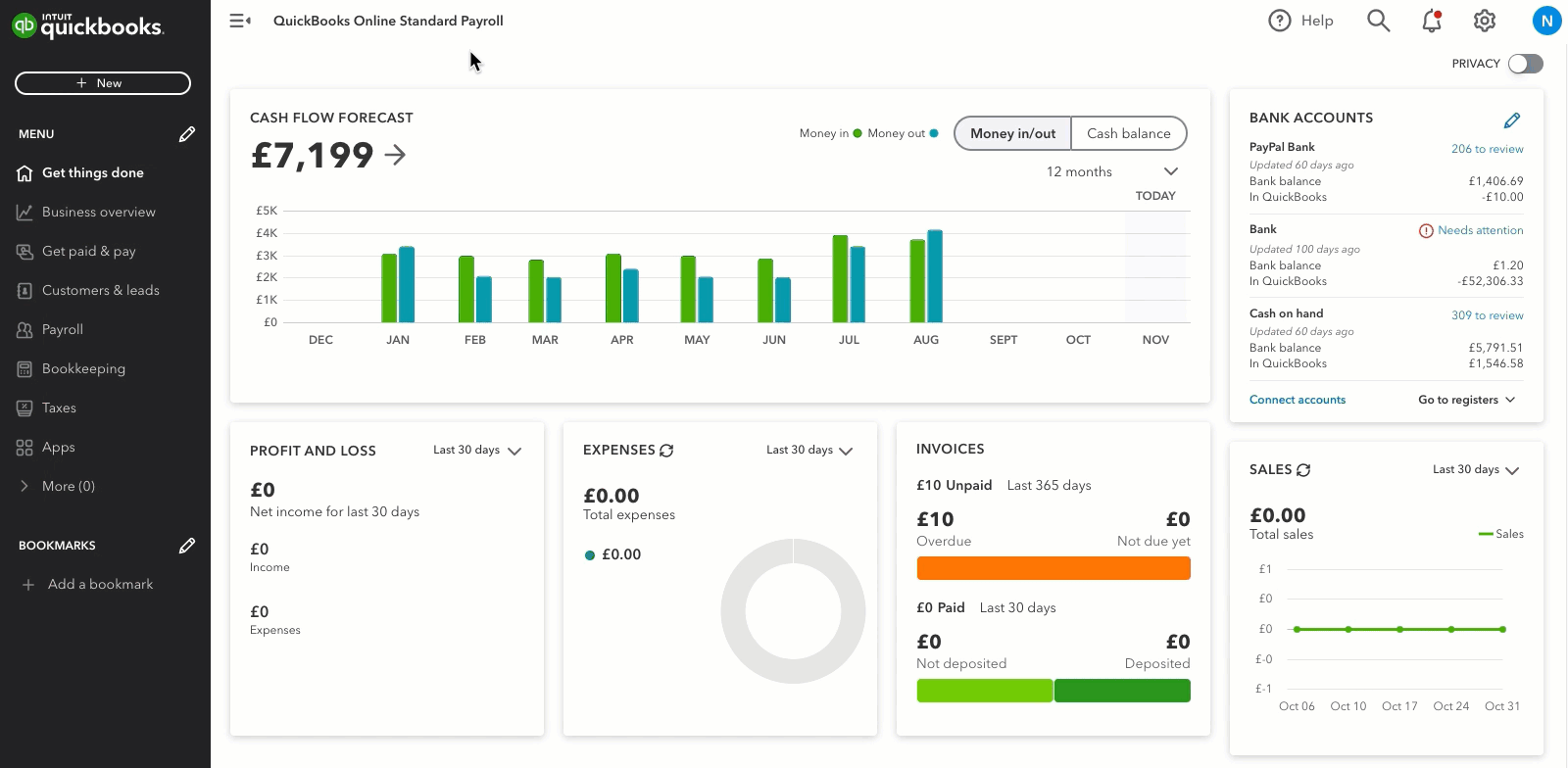
Image Source: Quickbooks
I’ve read countless online reviews about QuickBooks, and one thing that keeps coming up is how helpful it is for managing income, expenses, and calculating tax deductions.
Here’s how it works: You simply enter your business expenses into QuickBooks, and the software automatically categorizes them.
Then, when it’s time to file taxes, you can easily generate a report of all eligible deductions. It also keeps track of your previous years’ deductions, so you can easily avoid taking the same deduction twice.
According to online reviews from existing users, QuickBooks is more than an accounting software. It’s a powerful tool that offers invoicing, expense tracking, payroll management, and automatic bookkeeping – all under one platform.
What You’ll Like:
- Allows you to track payments and expenses by syncing transactions automatically
- Offers professional-looking customizable templates that make it easy to create and send invoices quickly
- Allows you to pay bills directly from your account and automate payment for recurring invoices
- Offers a tool for employee timesheets and project tracking to track work hours accurately
- Maximizes tax deductions by monitoring expenses and categorizing them automatically
What You May Not Like:
- You don’t get bill management capabilities in the basic plan
- Some users report that the tool does not offer advanced features for invoice designing
Pricing:
- Starts at $15/month.
Best Time Tracking Software
These tools help you manage time more effectively, improve productivity, and accurately bill clients for the hours worked. By tracking time spent on projects, consultants can allocate their time and resources efficiently, leading to increased profitability and better client satisfaction.
7. Clockify – Best for Productivity Tracking
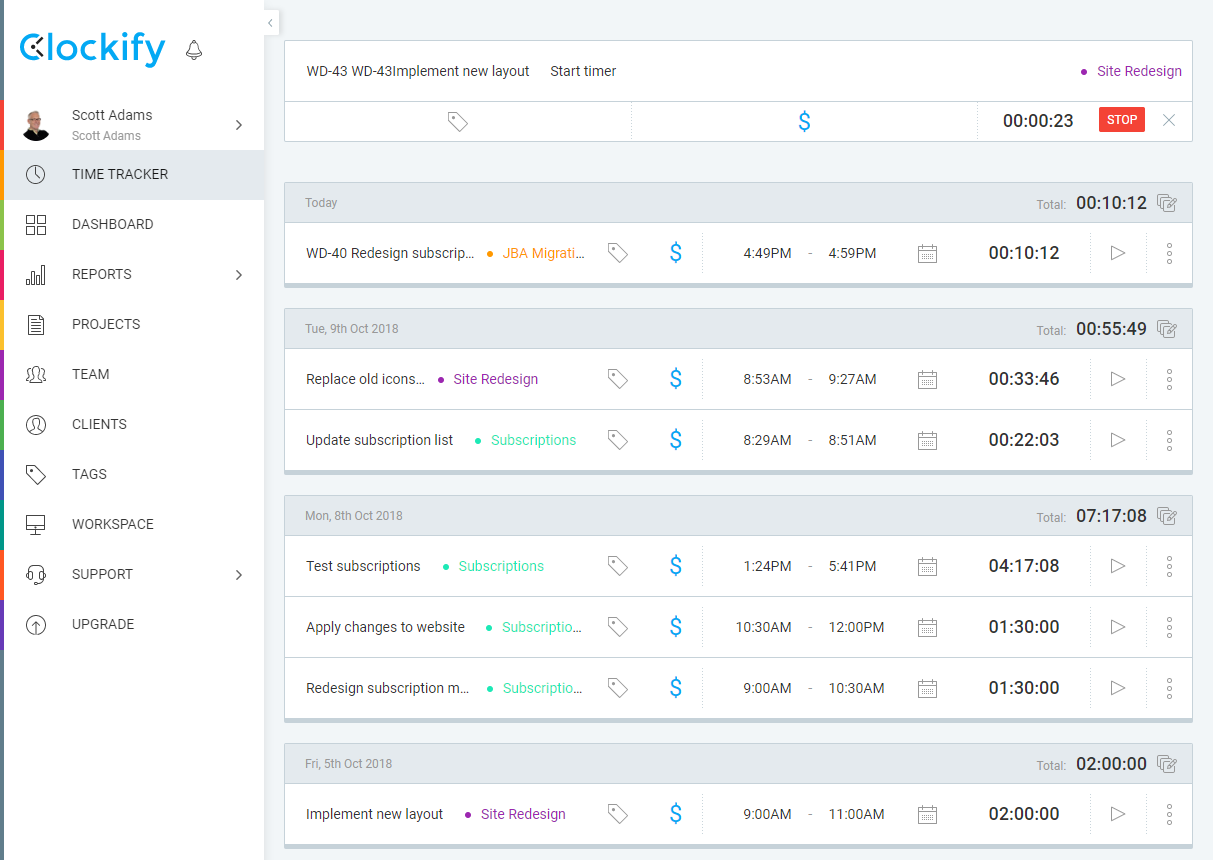
Image Source: Youtrack
Clockify is a cloud-based time tracker and timesheet app for business consultants to track work hours across projects. I learned about it from a past colleague – her eCommerce firm uses it to track productivity.
The first thing I like is the tool’s ability to track how long you spend on each task.
Here’s an example: You probably have a lot of emails and meetings to attend every day. Using the tool, you can realize that you spend more time on these activities than on actual work. This way, you can check productivity, adjust priorities, and focus more on projects with strict deadlines.
Clockify also allows you to track time by project and client. This helps visualize how your time is being allocated and identify areas where you need to boost efficiency.
What You’ll Like:
- Allows you to track time accurately using a free timer or by manually entering hours
- Provides comprehensive reports that showcase time spent on various activities and projects
- Efficient scheduling to avoid overloading team members and ensure project completion within set deadlines
- Project expense tracking makes invoicing and budgeting easier
- The ability to collaborate with your team to track time, assign tasks, and monitor progress
What You May Not Like:
- The free plan does not track breaks and time offs
- Some users have reported that the mobile app faces occasional syncing issues
Pricing:
- A free plan is available (does not offer break-time tracking). Paid options start at $3.99/user/month.
8. factoHR – Best Employee Time Tracking Software

Image Source: factorHR
FactoHR employee time tracking software, coupled with its timesheet functionality, offers businesses a comprehensive solution for efficiently managing and monitoring employee working hours.
The main thing I like about the tool is its mobile accessibility feature. This feature allows employees to log their work hours and tasks from anywhere, which is a huge advantage.
Here’s an example: imagine an employee who is attending a client meeting outside the office. With the mobile accessibility feature, they can easily log the time spent at the meeting directly from their smartphone. This feature helps ensure accurate time tracking and timely submission of timesheets. This flexibility enhances productivity and ensures that work-related tasks can be completed efficiently, regardless of location.
It is particularly effective for consulting firms needing to track billable hours efficiently. factoHR’s timesheet management feature enables employees to submit detailed timesheets, including completed hours, tasks, and project allocations.
What You’ll Like:
- Clock-in and Clock-out features to easily record start and end times for work shifts, providing accurate data for time tracking.
- Timesheet management to help employees submit detailed timesheets of their hours, tasks, and project allocations.
- Project-based tracking feature to assign tasks within timesheets for accurate time tracking of activities.
- The Overtime Tracking feature auto-calculates overtime hours, ensuring labor law compliance.
- Integration with Payroll for seamless time-tracking and data transfer, ensuring accurate payroll processing.
What You May Not Like:
- The free trial is available for a limited time
- The “Essential” plan lacks the payroll management feature
Pricing:
- Custom Pricing
9. TimeCamp – Best for Project Profitability Analysis
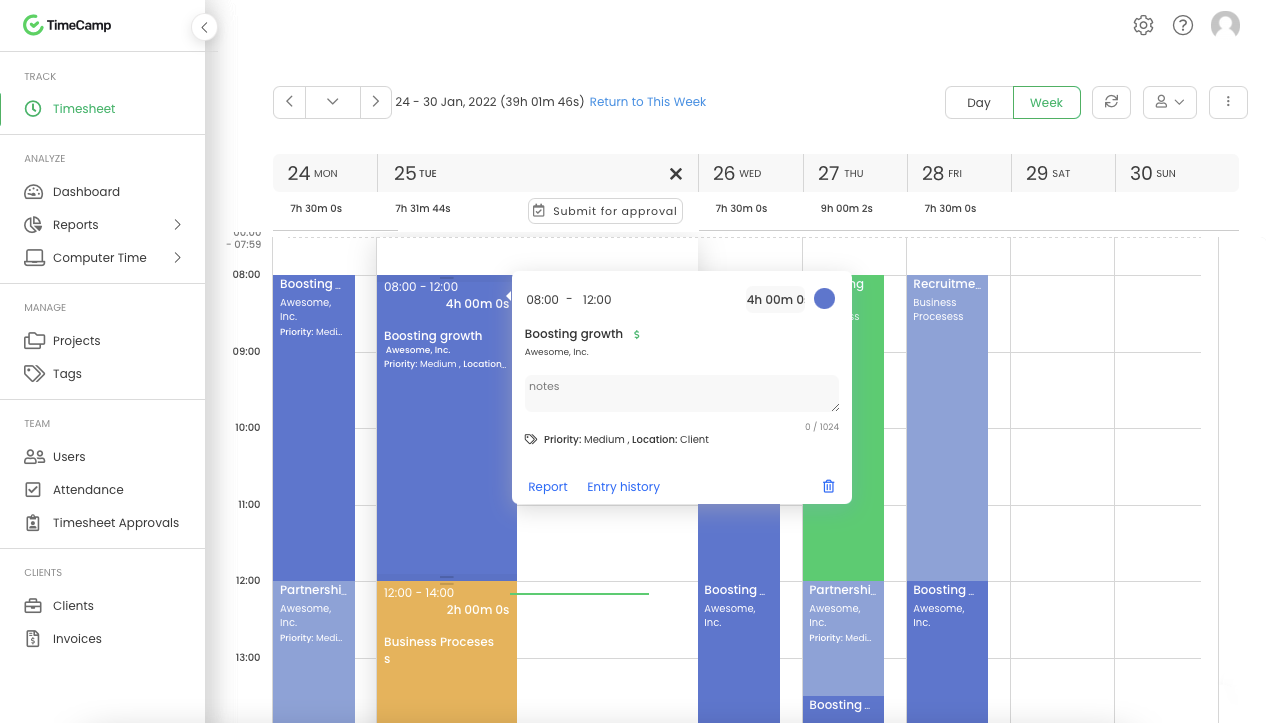
Image Source: G2
TimeCamp is another time tracking software and also the one my company has started using recently. From what I’ve heard from my colleagues, the tool excels in analyzing project profitability.
We purchased the pro plan because the starter ones capped features like billable rates, custom user roles, etc. – the ones we were looking for.
The tool allowed me to track time and costs on a granular level to see exactly how much each project is making or losing.
For example, we recently launched a new project for one of our products.
We used TimeCamp to track the time our team spent on it and analyze the associated costs, such as advertising and content production. We found the campaign was profitable overall, except we were slightly overspending on non-billable tasks, such as research and coordination.
What You’ll Like:
- Automatic time tracking to eliminate the need for manual input and ensure accurate counting of work hours
- Detailed reports on time usage to analyze productivity, identify time-wasting activities, and make data-driven decisions
- The ability to generate invoices based on tracked time, ensuring accurate billing for clients
- Budgeting features that let you set cost limits for projects and track them to ensure they stay within budget
- Attendance tracking functionality for employees to log their work hours and track absences
What You May Not Like:
- The free plan does not track attendance, overtime hours, or time-offs
- Some users complained of having issues with the checkout page, which is somewhat confusing and requires design improvements
Pricing:
- A free plan is available (without attendance or overtime tracking). Paid options start at $2.99/user/month.
Best Proposal Software
Business proposal software tools can help you create, store, and manage propositions more efficiently. They reduce non-billable time spent on drafting content. Such tools also maintain consistency in branding and style, provide real-time updates, and improve the sales pipeline and performance.
10. PandaDoc – Best for Contract Management
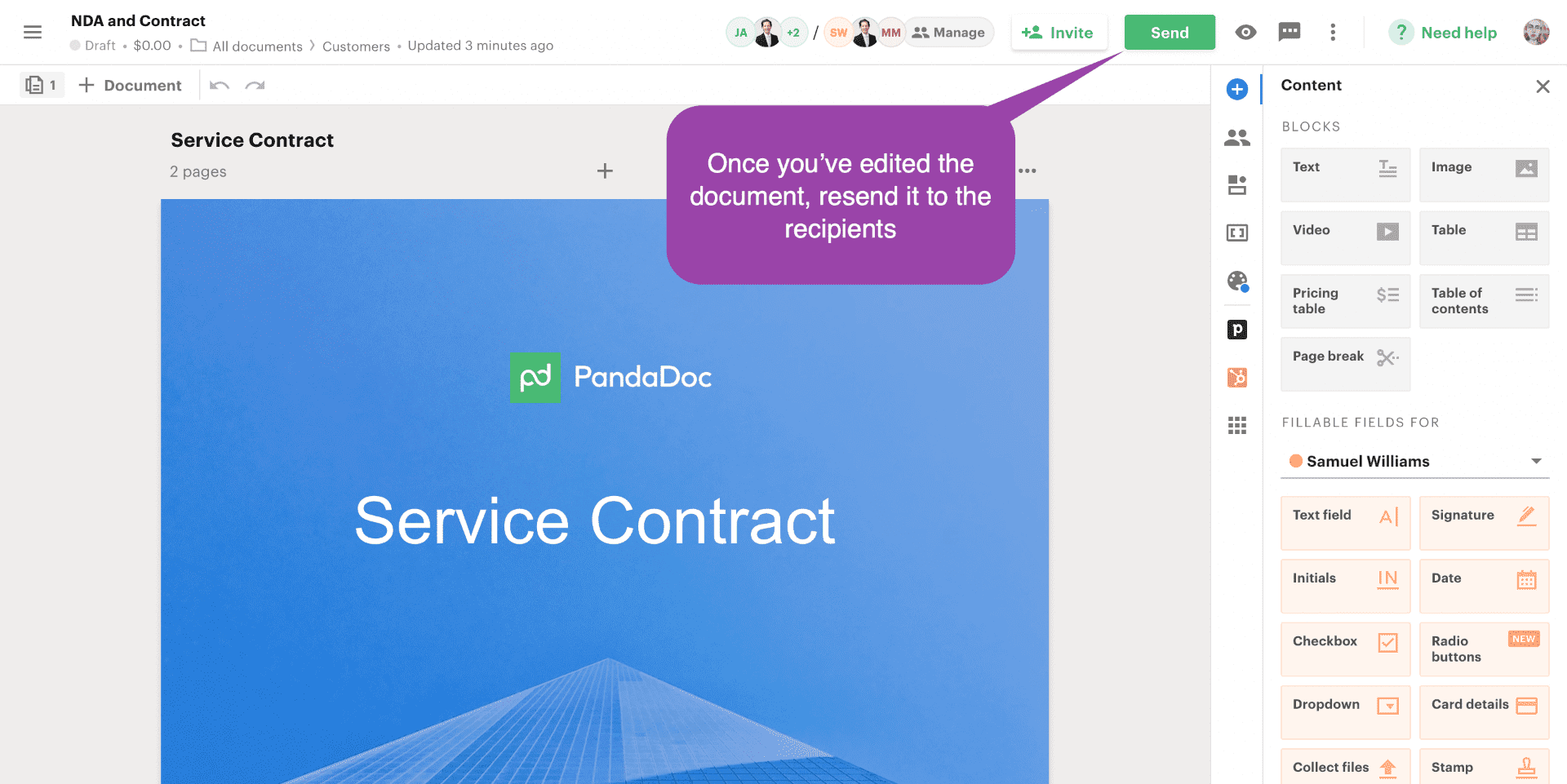
Image Source: Pandadoc
An industry expert recommended PandaDoc – a proposal software for business consultants.
What you will first notice is its e-signature feature. It’s so easy to get clients to sign contracts electronically. You can simply email them a link to the agreement, and they can sign it with a few clicks.
But, the star of the show is its contract management system. So, what does it do?
Well, it helps you streamline the entire contract lifecycle, from creation to payment. You can organize all contracts with multiple addendums and modifications.
The platform has a library of pre-made templates you can customize with your branding and terms and conditions. You can also add clauses and attachments as needed.
And the best thing is that all contracts are stored in a central repository. You can access it anywhere and track its expiration dates to send renewal reminders to clients.
What You’ll Like:
- Seamless e-signature collection and robust audit trails for easy tracking of document signatories
- Efficient document management through streamlined approval workflows and reliable version control capabilities
- Real-time notifications to stay informed when clients engage with your proposals
- Enables you to immediately request and securely collect payments from clients upon contract signatures
- Valuable insights into your documents with comprehensive analytics for informed decision-making
What You May Not Like:
- The starter plan has no CRM integration support
- The company’s customer support could have been better, as reported by some users
Pricing:
- Starts at $19/seat/month.
11. Proposify – Best for Sales Proposal Templates
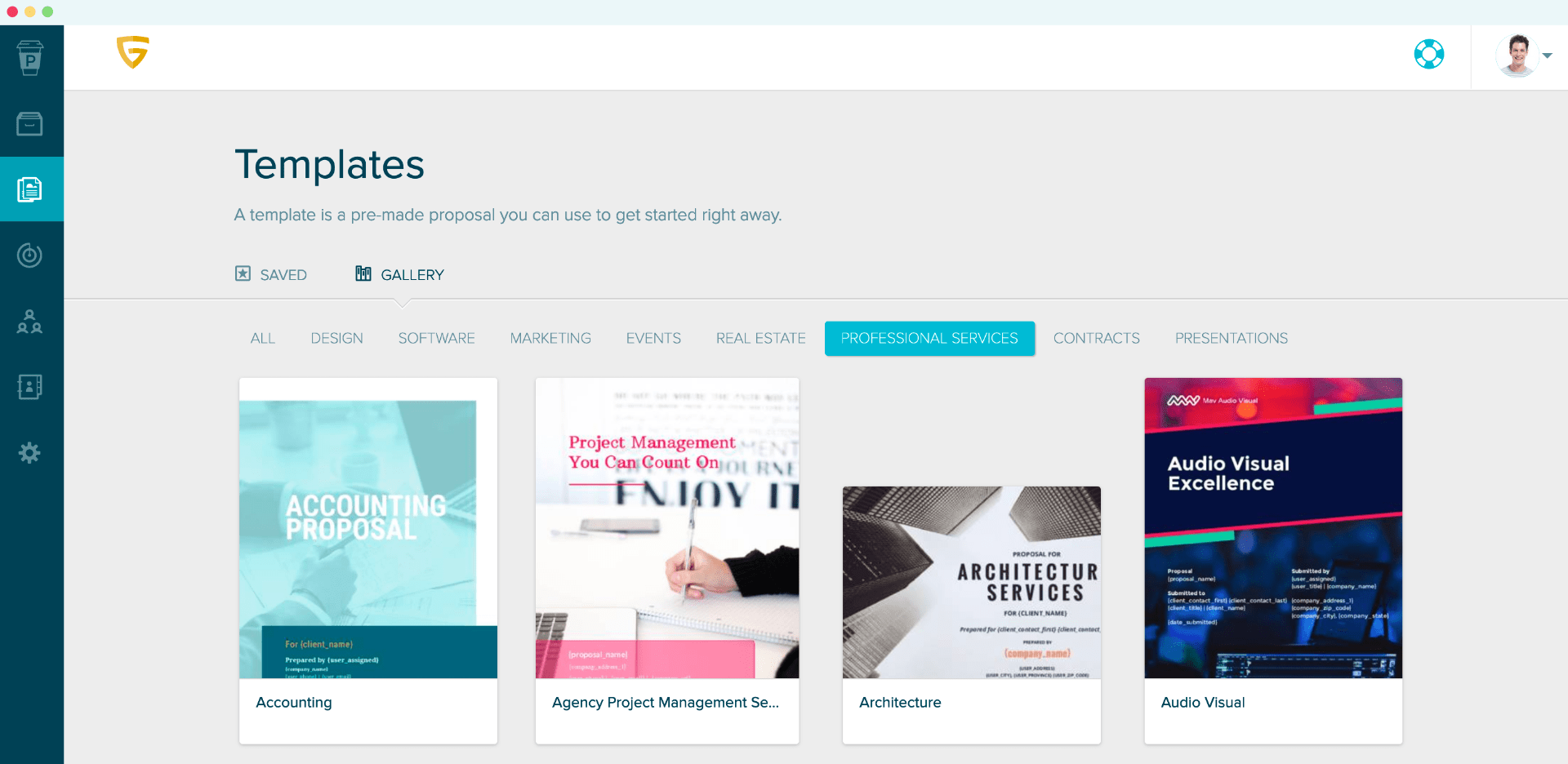
Image Source: G2
As someone who has spent years working with different business proposal software, I can say Proposify is a lifesaver!
Think that’s an exaggeration? Not, really.
You’ll probably feel the same when you check its huge library of customizable sales proposal templates.
The templates are well-written and easy to customize. I can add my own branding, logo, and contact information in just a few clicks. I can also add and remove sections from the templates to make them more relevant to each client.
The software also makes it easier to track proposal statuses with its advanced search and filter options.
You can easily find out which proposals are still pending, which have been accepted or declined, and which require follow-up. It does save a lot of time and effort.
What You’ll Like:
- Allows your clients to sign documents digitally from any device remotely
- Provides engagement metrics for your proposals, such as views, time spent, comments, etc.
- Delivers proposals using encrypted and secured links to ensure maximum confidentiality
- Allows you to create a library of sales proposal templates, content, images, etc., for future use
- Real-time notifications and automated reminders to instantly get notified whenever a proposal is viewed or signed
What You May Not Like:
- The starter plan does not allow you to set custom roles and permissions
- Some users feel the tool lacks collaborative editing capabilities
Pricing:
- Starts at $49/user/month.
Which is the Best Business Consulting Software?
Business consulting tools can accelerate business growth by automating redundant activities while helping you focus more on serving clients better. You need a combination of the best business consulting software solutions to accomplish this.
My top three picks from the list of the 11 best software for consultants would be –
Option A: BIGContacts
BIGContacts is a small business consulting CRM software that is simple to use, affordable, and offers a generous trial period. It excels in contact management, where you can sort them by pending or upcoming activity, opportunity, last contact, or last communication. The tool has workflow automation features to capture more leads, connect web forms, import spreadsheets, etc.
Option B: ClickUp
ClickUp is a project management software that provides a single-view dashboard to manage tasks, projects, and deadlines in one place. It allows you to easily break down tasks into subtasks and use Kanban boards to visualize the workflow. You can create custom fields for each client, making it easy to see the tasks that need to be completed for each client.
Option C: Freshbooks
FreshBooks is a cloud-based accounting software that unifies invoices, expenses, and payments in one place. It allows you to easily see which clients are paying on time and who are falling behind. This helps you prioritize those clients that are most important to your business. The tool also gives you a real-time view of your financial performance to visualize business progress over time.
But then, the final choice comes down to your business objectives.
For example, if you need powerful proposal software, PandaDoc would be a better choice to manage business contracts. Following this, while a time tracking software like Clockify is great for tracking productivity, TimeCamp takes the lead with its additional benefits like profit analysis.
Regardless of what you end up choosing, it’s always a good idea to use the free trial to get a first-hand experience!
Evaluation Criteria
The evaluation of products or tools chosen for this article follows an unbiased, systematic approach that ensures a fair, insightful, and well-rounded review. This method employs six key factors:
- User Reviews / Ratings: Direct experiences from users, including ratings and feedback from reputable sites, provide a ground-level perspective. This feedback is critical in understanding overall satisfaction and potential problems.
- Essential Features & Functionality: The value of a product is ascertained by its core features and overall functionality. Through an in-depth exploration of these aspects, the practical usefulness and effectiveness of the tools are carefully evaluated.
- Ease of Use: The user-friendliness of a product or service is assessed, focusing on the design, interface, and navigation. This ensures a positive experience for users of all levels of expertise.
- Customer Support: The quality of customer support is examined, taking into account its efficiency and how well it supports users in different phases – setting up, addressing concerns, and resolving operational issues.
- Value for Money: Value for money is evaluated by comparing the quality, performance, and features. The goal is to help the reader understand whether they would be getting their money’s worth.
- Personal Experience / Experts’ Opinions: This part of the evaluation criteria draws insightful observations from the personal experience of the writer and the opinions of industry experts.
Learn More About Business Consulting Software
What is business consulting software?
Business consulting software is a suite of tools that helps consulting firms manage their clients, projects, and resources more effectively. It can help you:
- Improve client relationships by managing all interactions in one place
- Streamline project management processes by tracking tasks, deadlines, and budgets
- Automate administrative tasks, such as time tracking and invoicing
- Gain insights into business performance with detailed reports
What are the different types of business consulting software?
Business consulting software can be categorized into four main types:
- CRM (Customer Relationship Management): Helps consultants manage client relationships, track interactions, and improve communication. Example: BIGContacts.
- Financial and Accounting Software: Assists in financial analysis, budgeting, and forecasting. Example: QuickBooks.
- Proposal and Presentation Software: Aids in creating professional reports, proposals, and presentations for clients. Example: Proposify.
- Project Management Tools: These help consultants manage tasks, timelines, and resources for client projects. Example: ProProfs Project.
- HR and Talent Management Software: Assists in talent acquisition, employee management, and organizational development. Example: Clockify.
How can I know which type of business consulting software is required for my business?
There’s no one particular software or software type that can manage your business in all aspects. To be able to deliver high-quality services to clients, you need a combination of different tools – based on your business requirements.
For example, while BIGContacts is a CRM and email marketing software for small businesses, it does have task management features too.
But, if you are looking for enterprise-level project management software solutions, you need to look for dedicated tools like ProProfs Project.
How do you choose the best business consulting software?
No matter which type of business consulting software you choose, there are some factors that you should consider before buying one. Here are some of such factors –
- Determine your needs: What are the main challenges you face in your consulting work? What are the specific features or functions that you need to support your workflows and processes?
- Research options: Explore software options in your chosen categories, considering factors like features, scalability, and user-friendliness.
- Pricing: Determine your budget and compare software pricing, including subscription fees or licensing costs.
- User feedback: Read online reviews and seek recommendations from peers to gauge user satisfaction and software performance.
- Integration: Ensure the software can integrate with existing tools and systems used in your consultancy.
- Scalability: Choose software that can grow with your business and adapt to changing needs.
What are the benefits of having business consulting software for your business?
Business consulting software can provide a number of benefits to your business, including:
- Improved efficiency: Helps you automate many of your administrative tasks, such as time tracking, invoicing, and reporting – freeing up your time to focus on more important tasks.
- Enhanced client relationships: It gives you a complete view of each client’s interactions with your firm, including their project history, contact information, and communications.
- Improved project management: It lets you manage projects more effectively. It can help you track tasks, deadlines, and budgets, thus identifying potential problems early on.
- Better insights: Provides you with detailed reports on your business performance that help you identify areas where you can improve your efficiency, productivity, and profitability.
How much does business consulting software cost for small businesses and startups?
The cost of business consulting tools varies depending on the vendor, the software’s features, and the company’s target audience. So, the price can be as low as below $10 a month to more than $100 a month.
For instance, a startup or small business consulting CRM software like BIGContacts has a price tag of just $9.99 per user per month. It also offers a 15-day free trial to let you try it first before making a purchase.
FREE. All Features. FOREVER!
Try our Forever FREE account with all premium features!






